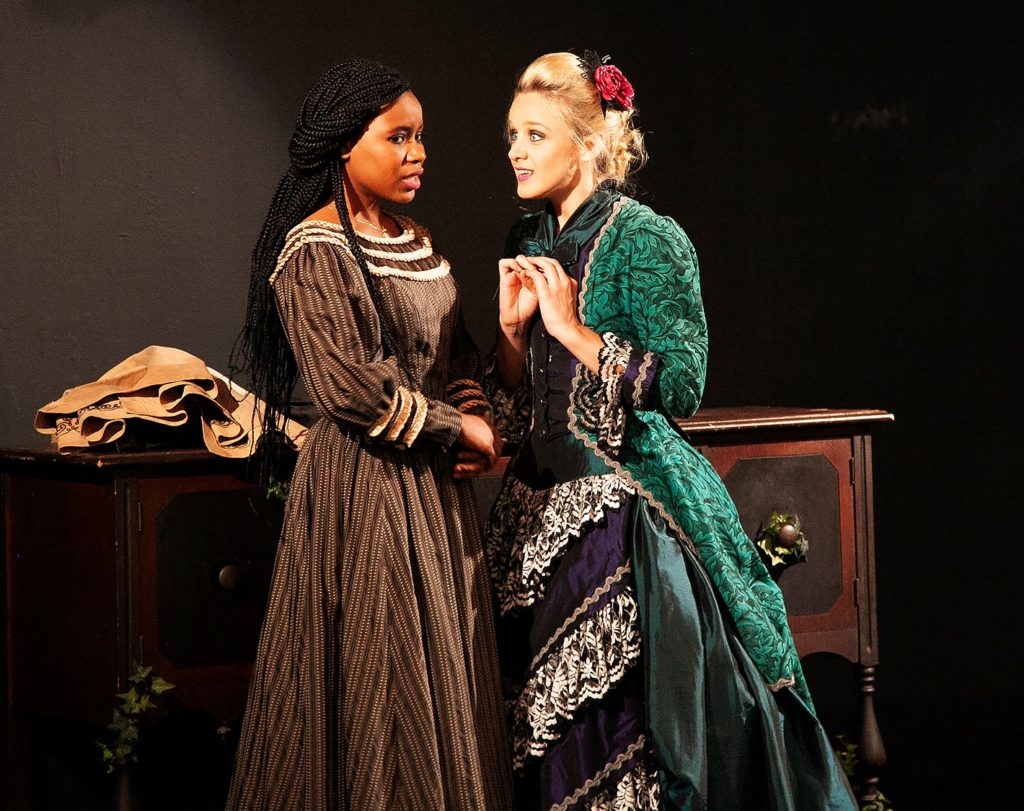
Photo via Entropy’s Facebook page.
Presented by Entropy Theatre Company
By Jen Silverman
Directed by Joe Juknievich
Dramaturgy by Jo Michael Rezes
Movement Direction by Kayleigh Kane
November 8 – 17, 2019
Plaza Black Box Theatre
Boston Center for the Arts
Boston, MA
Entropy on Facebook
Critique by Kitty Drexel
“Some of them want to use you/Some of them want to get used by you
Some of them want to abuse you/Some of them want to be abused”
— “Sweet Dreams (Are Made of This)” by the Eurythmics
(Boston, MA) The Moors is Brontë novel fanfiction. It condenses all of the winsome trappings of gothic romance novels into one melodramatic package for our amusement. Jen Silverman funnels archetypal characters from gothic romances into dark, mysterious environments. They are forced to confront unsettling truths against a backdrop of death and decay. Then Silverman makes us watch. For the right viewer, The Moors is voyeurism.
Governess Emilie (Debbie Aboaba) has traveled to the Branwell home in response to an advert placed by Mr. Branwell requesting the services of a governess. She is received at the house by the sisters Branwell, Agatha (Kris Kim) and Huldey (Kaleigh Kane). It becomes immediately apparent to Emilie that nothing in the house is as it should be. Marjory (Robin Abrahams) the scullery maid looks disturbingly like Mallorie the parlor maid. Branwell is nowhere to be found. In fact, everything looks uncannily familiar but eerily dissimilar at the same time! Meanwhile, the Mastiff (Ryan Lemay) professes his love to the Moor-Hen (Sydney Grant).
The set design is very simple. Sparse furniture is used to outline the Branwell home. A brown sideboard is against the upstage wall. Two wooden chairs with faded, fuschia velour seating and wildflowers growing up their legs are placed in front of the stage right and left entry aisles. The lighting by Luke Lewkowicz replicates the bleak sunshine of English winters. The rest of the stage is bare and black.
The Branwell mansion is not a happy place. The cast’s bare feet but otherwise fully clothed bodies flit across the stage as if they’d prefer not to be there. I can see why. The black box was well heated but the minimalist set and lighting design make the room look cold.
Audience members might recognize The Moors from the September 2019 issue of American Theatre. An online article by Diep Tran discusses Silverman’s works-in-progress. Silverman discusses her plays Collective Rage: A Play in Five Boops, The Roommate, and others. It gives the reader incite into Silverman’s personality and a taste of her button-pushing, queer aesthetic. Silverman isn’t here to make nice.

Photo via Entropy’s Facebook page.
And Silverman didn’t. The characters in The Moors are after self-satisfaction at all costs. The Mastiff (Lemay) said he is searching for happiness. His definition of happiness depended upon the Moor-Hen’s complete submission. She refuses to submit. Agatha said that she desired results. She obtained control over the Branwell household.
In these cases and others, self-satisfaction was achieved through abusive methods; manipulation was the name of the game. Each character was willing to sacrifice others in order to obtain their mission. Huldey sacrificed family for an exciting fantasy life. Mallorie cut down anyone who pried into her business. Nothing and no one was safe from plot development. The Moors is a lot like Shakespeare in that respect.
The Moors is like Jane Eyre meets Young Frankenstein as written by Edgar Allen Poe. It has its comedic moments, but they are so dark that they might as well be bricked in the basement with only a small hole in the foundation to let the laughter through. The audience watches as wicked characters strip sheltered characters of their innocence.
Sincere, naive Emilie is routinely taken advantage of by the residents of Branwell house. What they call love is abuse in disguise. Twisting her mind through manipulation and gaslighting is sport to them. We at first perceive Emilie’s abuse as clever metatheatre references made by Silverman. As the play progresses, we can’t decide if Silverman is toying with the gothic romance archetypes or if she discussing abusive power dynamics. Or both. There is a lot in this script to dissect.
There is no spoken dialogue so perfect that it can’t be made better by being sung. Words communicate our truths; music enhances them. There are three musical interludes in The Moors. Emilie (sweetly voiced Aboaba with a lute) sings a lullaby to her new family in the play’s first act. Agatha (Kim who nailed the short solo) sings an intimate, improvisational ditty to Emilie at the end of the play’s second act. In the play’s final act (Kane in most Metal solo Victorian England has ever seen), Huldey rocks the mic after committing an act of independence. It’s through these solos that we become better acquainted with our characters.
The Moors could be triggering for some attendees. Jen Silverman isn’t going to use flowery metaphor to protect our dainty minds. Two characters casually discuss raping a character we never meet. Two characters are victims of violence that we don’t see. With one exception, they are all unpleasant people. The maid (Abrahams) is so duplicitous that everyone trusts her not to be trustworthy.
On the whole, Entropy’s The Moors is successful theatre. It tells a unique story with a unique voice. The company is still developing its place in Boston’s fringe theatre community but, if funding and audiences infrastructure allow, it can create a niche for itself in our community. Entropy is in good company with other theatres that create dark, fantastical productions like imaginary beasts, the Slaughterhouse Society, and even Sleeping Weazel.
Fans of gothic romance novels who didn’t catch Entropy’s The Moors at the BCA while they could, should seriously consider reading Jen Silverman’s script. It is published through Samuel French and can be found at your favorite, local booksellers. It’s preternatural, lesbian fanfiction and it’s worth the read.
